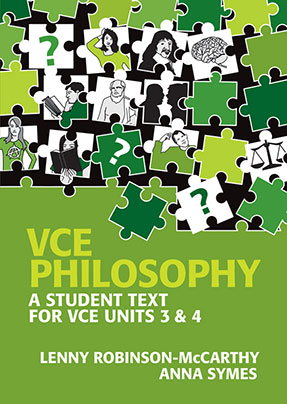With its lively and stimulating approach,
this book is an essential classroom companion
and the perfect student introduction to
the exciting world of philosophical inquiry.
The Book
We present the first textbook for VCE Philosophy Units
3 and 4. Providing detailed guidance to set texts, background and
contextual material, as well as extensive activities, review questions
and practical tips on preparing for assessment, this book will prove
indispensable for teachers and students alike.
Drawing on decades of teaching and assessing experience, the
authors invite students to actually do philosophy, while at the same
time providing comprehensive grounding in all the Key Knowledge
and Key Skills outlined in the latest VCE Philosophy Study Design.
Through a variety of engaging classroom tasks and discussion
activities, students are encouraged to critically reflect on arguments
and ideas, and develop skills of reasoning, analysis and evaluation.
Close examination of primary texts is a strong feature,
reflecting the new emphasis on this aspect of Philosophy across all
Units.
Teachers will appreciate the wealth of suggestions for lesson content,
assessment tasks, further resources, and advice on course design and
unit planning.
Contents
Chapter 1 – Introduction to Units 3 and 4
• A Guide to Studying Units 3 and 4 Philosophy
• What is Philosophy?
• Thinking about arguments – the basics
• Tips for studying VCE Philosophy
Chapter 2 – Minds and bodies
• Historical and philosophical background
• Key terms and concepts
• Close analysis of the set texts
• Key viewpoints and arguments in the set texts
• Critical responses to the viewpoints and arguments
in the set texts
• Relevant historical and contemporary debates
• Review questions and activities
Chapter 3 – Personal identity
• Historical and philosophical background
• Key terms and concepts
• Close analysis of the set texts
• Key viewpoints and arguments in the set texts
• Critical responses to the viewpoints and arguments
in the set texts
• Relevant historical and contemporary debates
• Review questions and activities
Chapter 4 – Conceptions of the good life
• Historical and philosophical background
• Key terms and concepts
• Close analysis of the set texts
• Key viewpoints and arguments in the set texts
• Critical responses to the viewpoints and arguments
in the set texts
• Relevant historical and contemporary debates
• Review questions and activities
Chapter 5 – Living the good life in the 21st
century
• The good life in the 21st century
• Contemporary debate: consumerism and the good
life
• Contemporary debate: technology and the good life
• Contemporary debate: Our good life and the good
of others
• Review questions and activities
Chapter 6 – Practical study suggestions
• Preparing for assessments
• Writing Philosophy essays
The Authors
Dr. Lenny Robinson-McCarthy (BA
[hons], Dip. Ed, PhD) has taught VCE
Philosophy at Preshil in Melbourne since
2001. She has also worked for the VCAA
in areas relating to VCE Philosophy
curriculum development and assessment
and as a private tutor for students of VCE
and IB Philosophy. In 2008 Lenny qualified
as a Philosophy for Children educator and,
under the auspices of VAPS, has designed
and run workshops in Community of
Inquiry for both primary and secondary
school teachers. Lenny is also a published
author of academic and creative works.
Anna Symes (B.A., B.Mus., Dip.Ed, Grad.
Cert.Gifted Ed.) has more than 20 years of
teaching experience in primary, secondary and
tertiary settings. Over a decade of teaching
at St Leonard’s College, Melbourne, she
established the school’s Philosophy program
and presented inservice sessions to teachers
around Victoria. Anna has been a consultant
to the VCAA in the development of VCE
Philosophy Curriculum since 2006 and has
worked on state and international examination
panels since 2001. She is currently tutoring on
Educational Philosophy and Psychology at the
University of Melbourne.
Gallery
Click thumbnails for a larger image.
|
